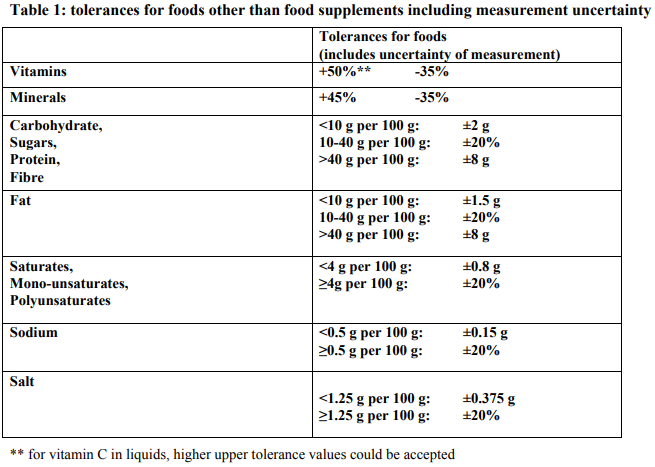It is recognised that it is not always possible for foods to contain the exact amount of nutrients labelled, owing to natural variations and variations arising from production and length of storage. However, it is important that the actual nutrient content of foods should not deviate substantially from labelled amounts, as the consumer could otherwise be misled.
As a result, the European Commission has drawn up, in collaboration with EU Member States, guidance on the setting of tolerances for nutrient values. The document sets tolerances for:
- the nutrition declaration under EU FIC;
- compliance with the levels of nutrients and other substances specified in Regulation (EC) No. 1924/2006 on nutrition and health claims;
- controlling the levels of vitamins and minerals specified under Regulation (EC) No. 1925/2006 on the addition of vitamins and minerals; and
- vitamins and minerals in food supplements.
(Source: Technical guidance on nutrition labelling - UK Department of Health, Page 20: Free PDF)
The following tables are from the EU
GUIDANCE DOCUMENT FOR COMPETENT AUTHORITIES FOR THE CONTROL OF COMPLIANCE WITH EU LEGISLATION ON:
Regulation (EU) No 1169/2011 of the European Parliament and of the Council of 25 October 2011 on the provision of food information to consumers, amending Regulations (EC) No 1924/2006 and (EC) No 1925/2006 of the European Parliament and of the Council, and repealing Commission Directive 87/250/EEC, Council Directive 90/496/EEC, Commission Directive 1999/10/EC, Directive 2000/13/EC of the European Parliament and of the Council, Commission Directives 2002/67/EC and 2008/5/EC and Commission Regulation (EC) No 608/2004
and
Council Directive 90/496/EEC of 24 September 1990 on nutrition labelling of foodstuffs
and
Directive 2002/46/EC of the European Parliament and of the Council of 10 June 2002 on the approximation of the laws of the Member States relating to food supplements
with regard to the setting of tolerances for nutrient values declared on a label
How this will be affected with Brexit when the UK leaves the EU is anyone's guess, although to start with, EU laws will be integrated into UK law to start with until the decisions are made by parliament on which laws to remove. (Source)

